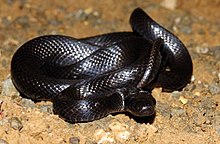| Persian ratsnake | |
|---|---|

| |
| Conservation status | |
 Data Deficient (IUCN 3.1) | |
| Scientific classification | |
| Domain: | Eukaryota |
| Kingdom: | Animalia |
| Phylum: | Chordata |
| Class: | Reptilia |
| Order: | Squamata |
| Suborder: | Serpentes |
| Family: | Colubridae |
| Genus: | Zamenis |
| Species: | Z. persicus |
| Binomial name | |
| Zamenis persicus (F. Werner, 1913) | |
| Synonyms | |
The Persian ratsnake (Zamenis persicus) is a species of medium-sized nonvenomous snake in the family Colubridae. The species is endemic to Western Asia.
Geographic range
Z. persicus is found in temperate northwestern Iran and Azerbaijan, in the area near the Caspian Sea.
Description
Adults of Z. persicus are from 70–90 cm (28–35 in) up to 120 cm (47 in) in total length (including tail), and usually jet black or grey with white markings along the lateral portion of the forebody. Males seem to grow larger than females.
Taxonomy
Z. persicus has habits very similar to Z. situla and for many years it was considered a subspecies of Elaphe longissima. It was granted full species status in 1984 (Nilson and Andrén).
Behavior
The Persian ratsnake is principally regarded as a terrestrial species, spending most of its time in the leaf litter; however, it is also an agile climber and will mount low brush.
Diet
The diet of Z. persicus, like that of most colubrids, consists primarily of small mammals, but it may also eat other small reptiles and amphibians.
Reproduction
Sexually mature female Persian ratsnakes lay clutches of 4–8 eggs, which hatch after 45–55 days of incubation.
In captivity
For Z. persicus, a hibernation period of 2–3 months is recommended.
References
- Boris Tuniyev, Natalia Ananjeva, Aram Agasyan, Nikolai Orlov, Sako Tuniyev, Steven Anderson. (2009). "Zamenis persica". IUCN Red List of Threatened Species. 2009: e.T164577A5909409. doi:10.2305/IUCN.UK.2009.RLTS.T164577A5909409.en. Retrieved 10 August 2023.
{{cite journal}}: CS1 maint: multiple names: authors list (link) - ^ "Zamenis persicus ". The Reptile Database. www.reptile-database.org.
Further reading
- Werner F. (1913). "Neue oder seltene Reptilien und Frösche des Naturhistorischen Museums in Hamburg ". Mitteilungen aus dem Naturhistorischen Museum in Hamburg 30: 1-51. (Coluber longissimus var. persica, pp. 23–24). (in German).
External links
| Taxon identifiers | |
|---|---|
| Zamenis persicus | |
This colubrid snake article is a stub. You can help Misplaced Pages by expanding it. |